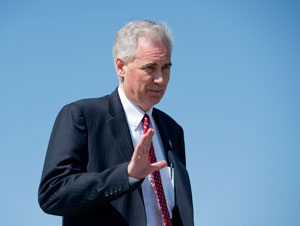CQ WEEKLY – VANTAGE POINT
July 14, 2012 – 1:01 p.m.
Turning a Ban on Its Ear
By Tait Militana, CQ Staff
A handful of House Republicans are using this year’s appropriations process to push provisions that would block future federal spending on transit and construction projects they oppose.

|
||
|
The tactic is unusual and looks a lot like an earmark — except in reverse. Rather than adding spending for a very specific project, they are trying to take it away.
Late in June, for instance, California Republican
McClintock vigorously opposes the Third Street Light Rail Phase 2 Central Subway project, although it does not lie in his district. In fact, he represents an area of northeastern California along the Nevada and Oregon borders. The light rail project is in the district of
On the floor, McClintock said the project was a “folly” that would cost federal taxpayers $1 billion.
Pelosi’s deputy press secretary, Carlos Sanchez, called the House vote “a minor setback that can be fixed in conference” between the House and the Senate.
Meanwhile, Ohio Republican
“I can’t allow a plan that only protects valuable government property while leaving residents’ lives, properties and livelihoods vulnerable,” she said in a press release.
Such amendments are a new feature in the spending debate that began when Republicans banned earmarks after they gained control of the House in 2010. Federal money is still used to finance local projects, but much of the power to secure targeted appropriations has been taken out of the hands of individual lawmakers, who have since sought new ways to influence spending.
For decades, lawmakers included so-called policy riders on appropriations bills to broadly block spending on programs they oppose, particularly when it comes to hot-button social issues. And while the tactic to block funding for local projects isn’t unprecedented, it is uncommon and is being used more publicly this year, with most of the language proposed through floor amendments.
“This is relatively rare, certainly at this level,” said Thomas A. Schatz, president of Citizens Against Government Waste, a budget watchdog group.
Turning a Ban on Its Ear
House Republicans say the effort isn’t unified, but a reflection of cost-consciousness. While unable to recapture money already spent on projects, they hope to use this year’s appropriations to eliminate future waste.
“On everybody’s mind is the deficit,” says Amanda Maddox, spokeswoman for California Republican Rep.
Denham was successful this year in using spending bills to highlight projects he opposes. His language to bar money from the high speed rail project was adopted in the House, and he successfully attached a provision to a Commerce-Justice-Science spending bill that would prohibit staff and administrative funding for a federal courthouse in Los Angeles.
Under one proposal, the high-speed rail line would pass through his district. The courthouse would be constructed outside it.
According to Schatz, the wave of prohibitive spending language shows how much vitriol still exists around earmarks.
“This is reiterating the fact that if it looks like an earmark,” he says, “it will be a target.”